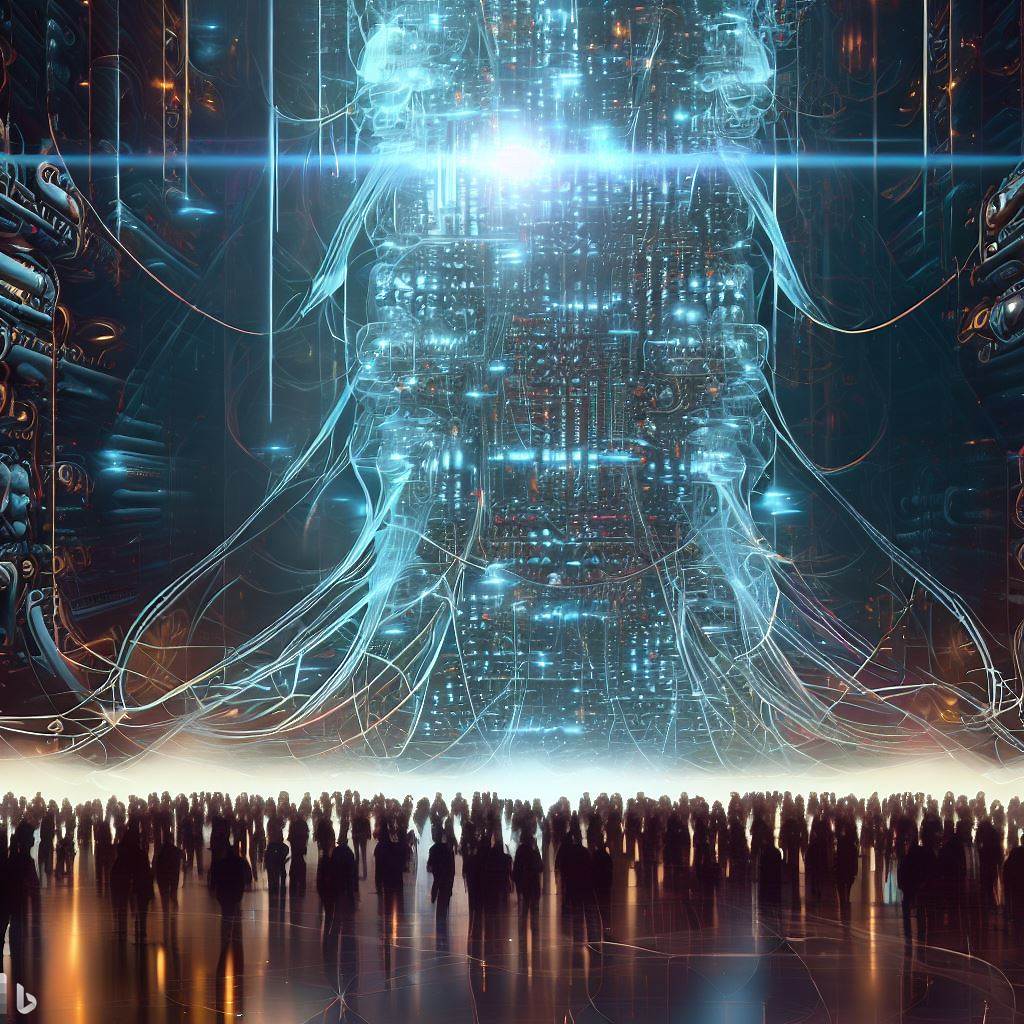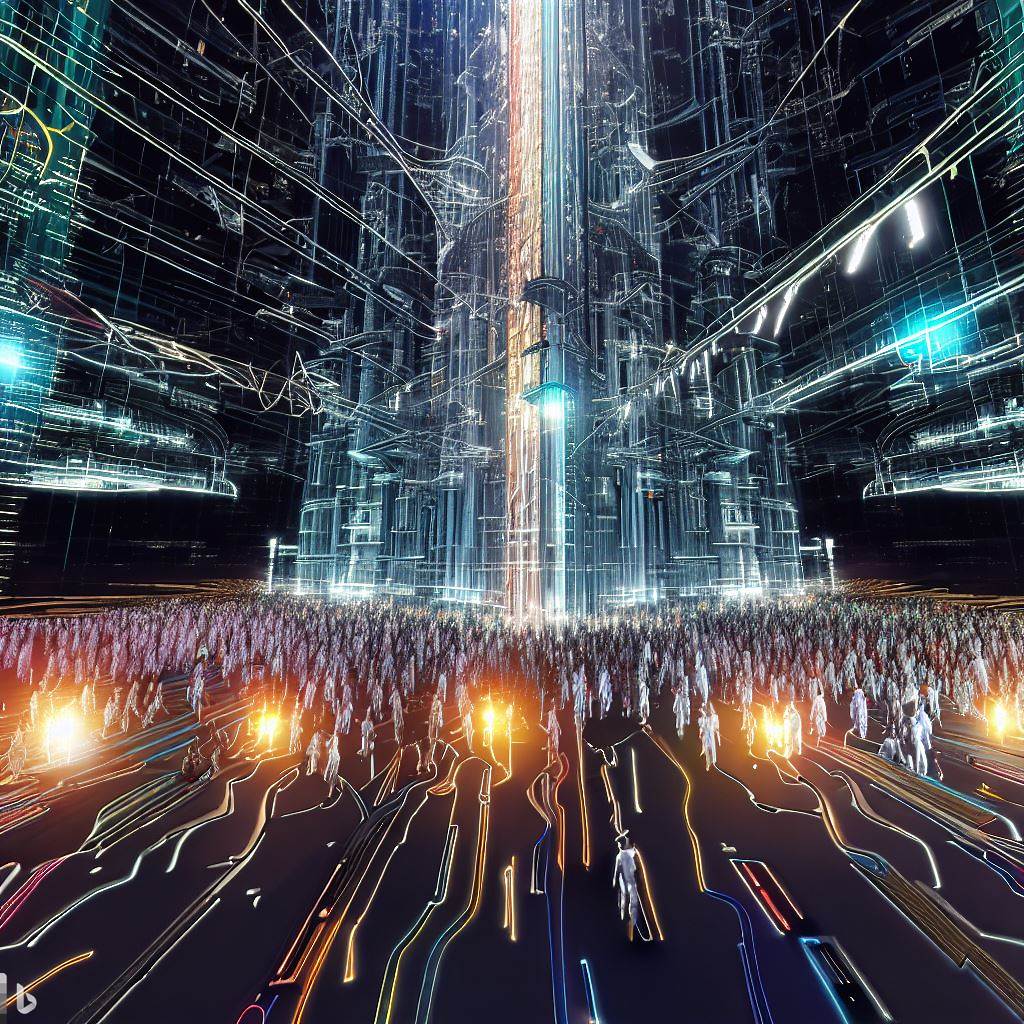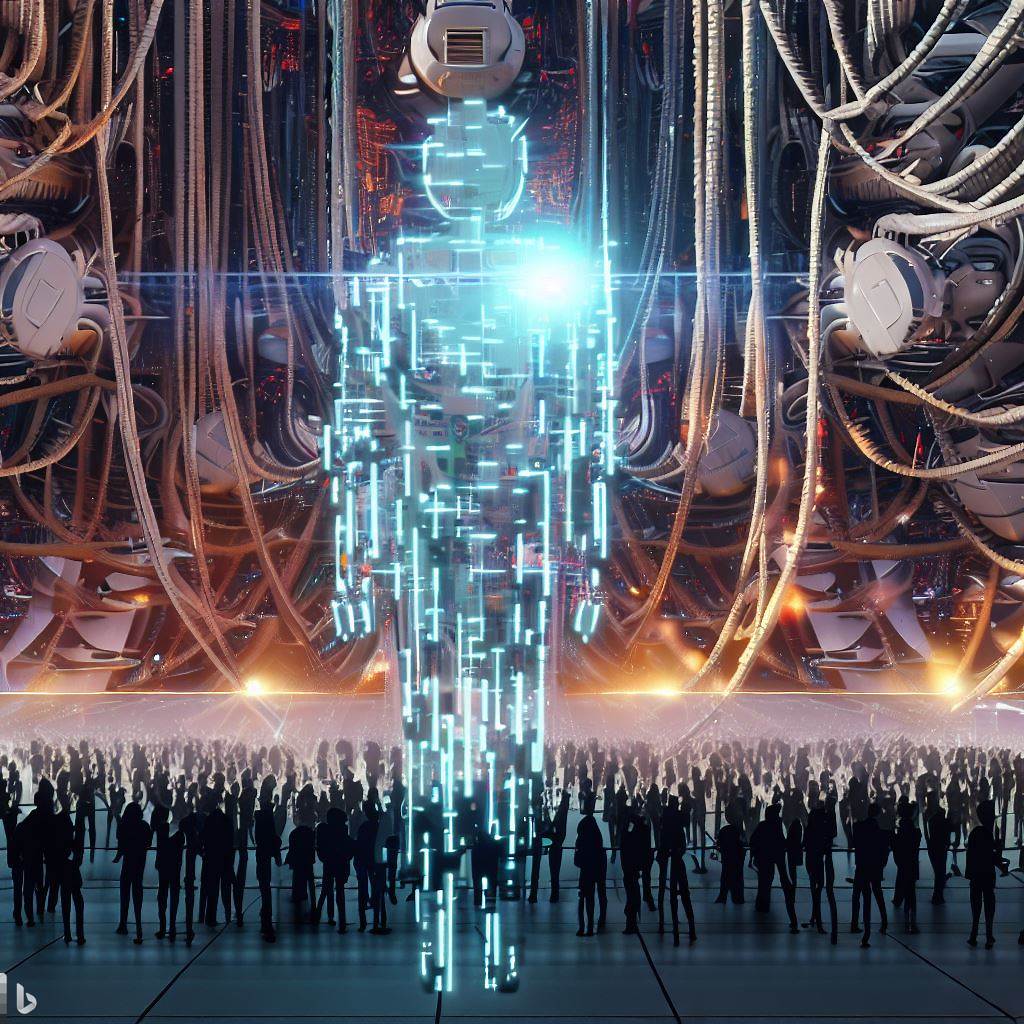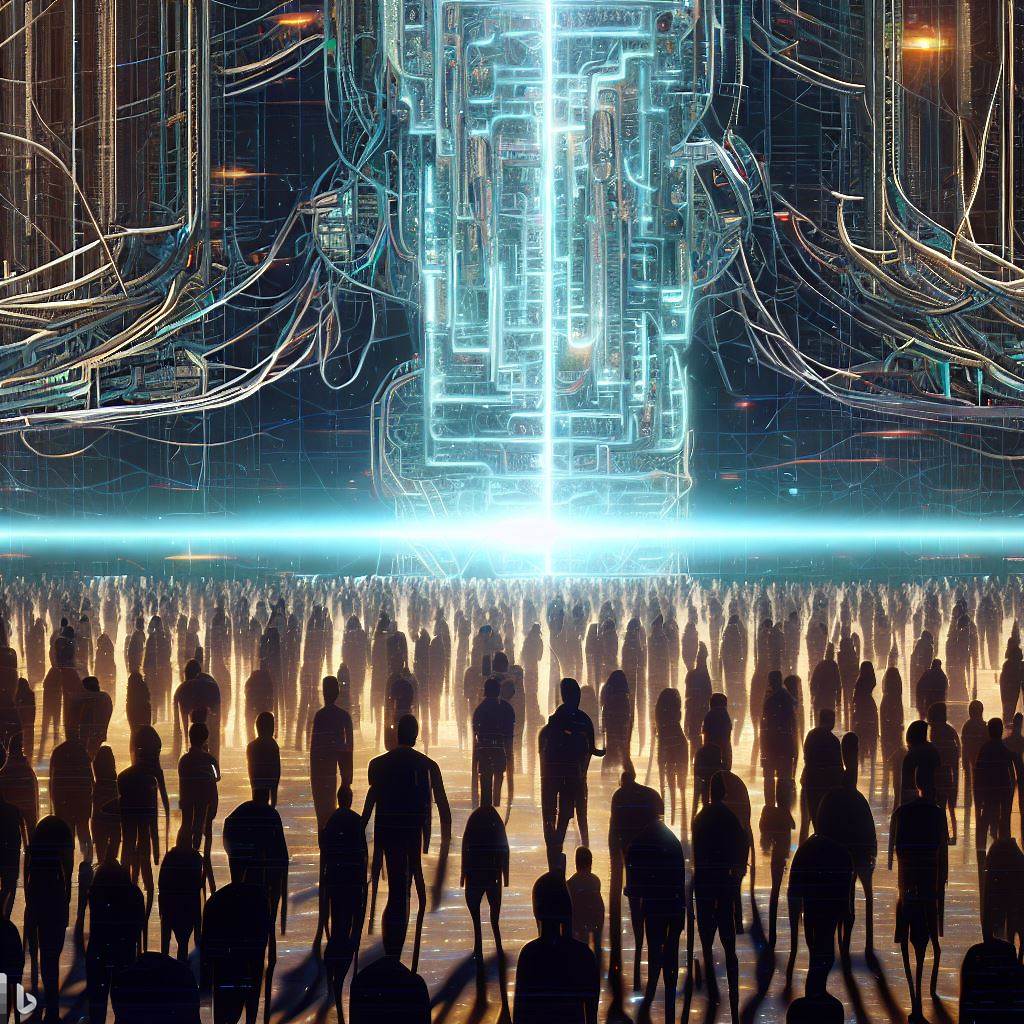The rise of Artificial Intelligence (AI) has brought about significant changes in society, transforming the way we live and work. With the potential to empower individuals and advance medical technologies, AI offers a myriad of possibilities. However, it also raises concerns about the emergence of a data dictatorship and the future of humanity.

This article explores the impact of AI on society and the economy, delving into the ethical and philosophical questions that arise in this era of profound change.
As AI becomes increasingly integrated into our daily lives, it has the power to revolutionize various sectors, from healthcare to manufacturing. The automation of simple tasks by machines has the potential to free up human resources, enabling individuals to focus on more complex and meaningful endeavors. This empowerment can lead to a more efficient and productive society, where human potential is maximized. However, this rapid rise of AI also threatens to eradicate numerous professions, creating a new class of workers displaced by machines. The question of how to navigate this transition and ensure that no one is left behind becomes crucial in maintaining a balanced and equitable society.
At the same time, the global shift towards democracy faces a potential challenge with the rise of data-driven autocratic regimes. As AI becomes the central nervous system of society, the economy transforms into a data processing machine. This dataism, as historian Yuval Noah Harari terms it, raises concerns about the concentration of power in the hands of a few, who control and manipulate vast amounts of data. The potential for a data dictatorship looms, where personal freedoms and privacy are compromised in the pursuit of efficiency and control. Therefore, it is imperative to explore the ethical and philosophical dimensions of AI, discussing the implications it has on individual freedom, humanism, and the future of humanity as a whole.
In conclusion, the rise of AI presents both opportunities for empowerment and the potential for a data dictatorship. While AI has the capacity to empower individuals and revolutionize various sectors, it also raises concerns about the eradication of professions and the concentration of power in the hands of a few. As we navigate through this era of profound change, it is essential to critically examine the impact of AI on society and the economy. By addressing the ethical and philosophical questions that arise, we can strive for a future that balances technological advancements with the preservation of individual freedom and humanism.

The Impact of AI
The impact of AI on society, as discussed by Yuval Noah Harari, is characterized by the empowerment of individuals through the transfer of mundane tasks to machines, the transformation of the healthcare sector into a mass service, and the democratization of media production through Generative AI, thereby challenging traditional power structures and heralding the advent of a new era in human history.
This empowerment stems from the ability of AI to automate repetitive and mundane tasks, freeing up human potential for more creative and complex endeavors. With AI taking over routine tasks, individuals can focus on higher-level problem-solving and innovation, leading to increased productivity and efficiency in various sectors.
However, the rise of AI also brings forth ethical implications and concerns, particularly in terms of job displacement. As AI technology advances, there is a growing fear that it will replace a significant portion of the workforce, leading to unemployment and economic inequality. Studies suggest that up to 25% of jobs in the United States and Europe are susceptible to automation.
Professions such as lawyers, accountants, clerks, journalists, and salespeople are at risk of being eradicated, challenging the traditional structure of the labor market. This job displacement raises questions about the future of work and the need for retraining programs and policies to ensure a smooth transition for those affected by automation. Balancing the benefits of AI with the potential negative consequences is crucial to ensure a fair and equitable society in the face of technological advancement.

Societal and Economic Changes
Societal and economic changes brought about by advancements in artificial intelligence have the potential to reshape the global labor market and political landscape.
One of the key concerns is job displacement and the challenges it poses for retraining workers. As AI technology continues to advance, certain jobs that rely on repetitive tasks or routine decision-making processes are at risk of being automated. This can lead to a significant number of individuals losing their jobs and facing difficulties in finding new employment opportunities.
Retraining workers to adapt to the changing job market becomes crucial in order to mitigate the negative impacts of AI on employment. However, this process can be challenging and may require significant investment in education and skills development programs.
Additionally, there is a concern that the benefits of AI will not be evenly distributed, leading to a further concentration of wealth and power. As AI technology becomes more prevalent, those who have access to and control over the technology may gain a significant advantage in the labor market, leading to increased inequality. Therefore, it is important for policymakers to consider strategies that promote a more equitable distribution of the benefits of AI to ensure that the societal and economic changes brought about by AI do not exacerbate existing inequalities.
The redistribution of wealth and power is another significant aspect of the societal and economic changes resulting from the rise of AI. As AI technology becomes more integrated into various industries, it has the potential to disrupt existing power structures. Traditional industries and professions may become obsolete or undergo significant transformations, leading to a redistribution of economic and political power.
This can have wide-ranging implications for society, including changes in social hierarchies and the concentration of power in the hands of a few. It is important for societies to actively engage in discussions and decision-making processes to shape the direction of AI development in order to ensure that the benefits of AI are shared by all and that power is not concentrated in the hands of a select few.
This requires transparency, accountability, and an inclusive approach to AI governance. By actively addressing these challenges and considering the potential impacts of AI on societal and economic structures, it is possible to navigate the changes brought about by AI in a way that promotes freedom, equality, and empowerment for all individuals.

Ethical and Philosophical Questions
Ethical and philosophical questions arise when considering the potential impact of advancements in artificial intelligence on human autonomy and the preservation of human values. As AI becomes increasingly integrated into various aspects of our lives, it raises concerns about the extent to which individuals can maintain personal freedom in a world where decisions are influenced by algorithms and machine learning. The use of AI in decision-making processes, such as in employment, finance, and healthcare, raises questions about fairness, accountability, and transparency. Algorithms that are trained on biased data can perpetuate existing inequalities and discrimination, potentially limiting the autonomy and opportunities of certain individuals or groups. Additionally, the reliance on AI systems for decision-making may lead to a loss of human agency, as humans become passive recipients of AI-generated recommendations and predictions.
To further explore the ethical implications of AI, it is essential to consider its impact on the future of human values. As AI continues to advance, it presents the possibility of challenging long-standing ethical frameworks and principles. For example, the development of autonomous systems capable of making moral decisions raises questions about the nature of responsibility and accountability. Who should be held liable when an AI system makes a morally questionable decision? Furthermore, the potential for AI to surpass human intelligence raises questions about the uniqueness and value of human life. Will AI be able to understand and uphold human values in the same way that humans do? These questions highlight the need for ongoing ethical deliberation and the development of frameworks that ensure AI is aligned with human values and respects individual autonomy.
| AI and personal freedom | AI and the future of human values |
|---|---|
| The integration of AI into various aspects of life raises concerns about the extent of personal freedom in a world influenced by algorithms and machine learning. | Advancements in AI challenge long-standing ethical frameworks and principles, raising questions about responsibility, accountability, and the uniqueness of human values. |
| The use of AI in decision-making processes, such as employment and finance, can perpetuate inequalities and limit individual autonomy. | The development of autonomous systems capable of making moral decisions raises questions about responsibility and the value of human life. |
| The reliance on AI-generated recommendations and predictions may lead to a loss of human agency. | Ongoing ethical deliberation and the development of frameworks are needed to ensure AI aligns with human values and respects individual autonomy. |
There is reasonable evidence that this article is machine-generated. Posting such content is considered fraud. Fraud is discouraged by the community and may result in the account being Blacklisted.
Guide: Why and How People Abuse and Defraud
If you believe this comment is in error, please contact us in #appeals in Discord.
I don't give a damn what you think. And if I'm on the blacklist, I don't care either. I write and post what I think and I don't care about the rest.